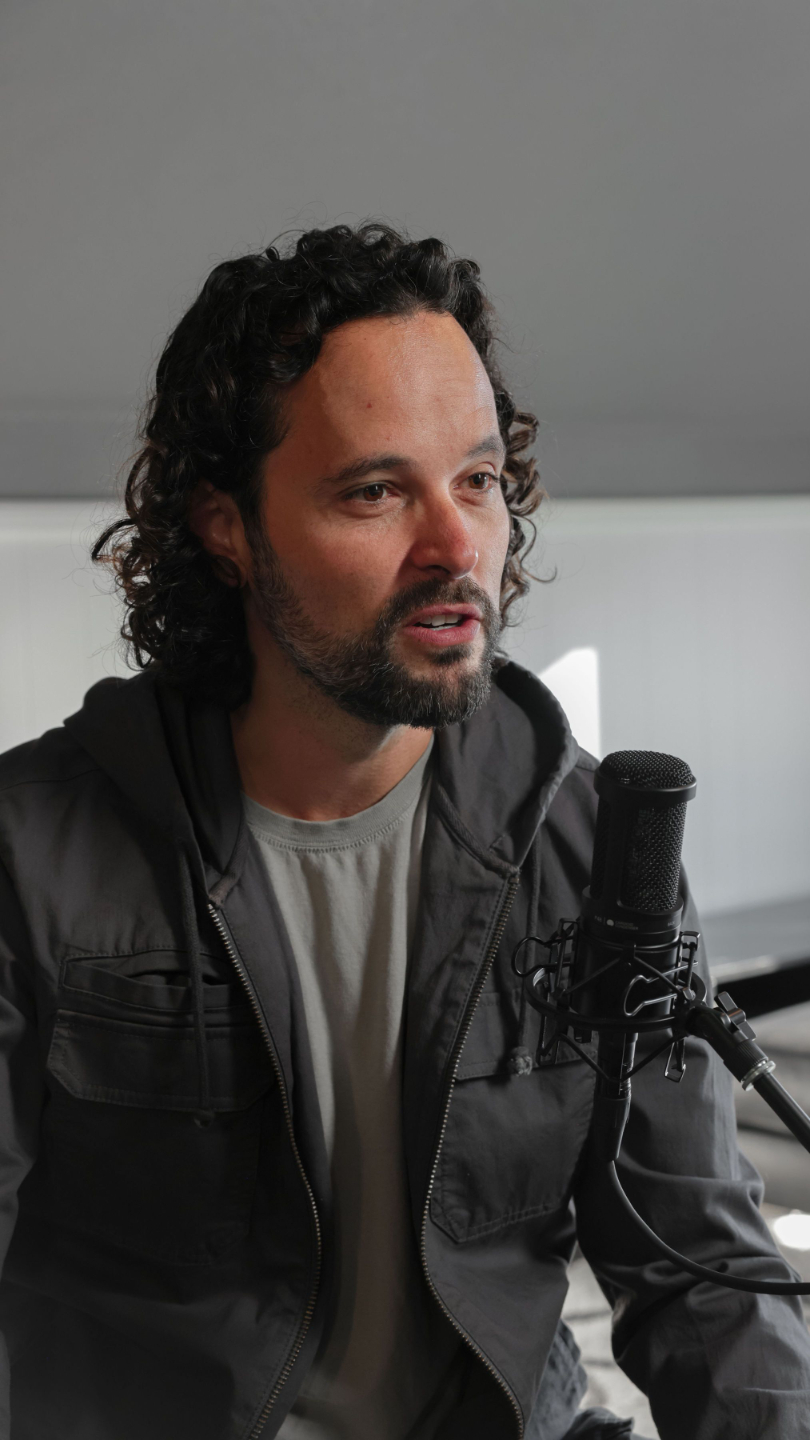Why You’re Great with Clients, Co-Workers, and Strangers—but Struggle with Your Wife
Why You’re Relational Everywhere—Except at Home
Let me ask you something. Have you ever been at work talking to a client, a coworker, or even just a stranger, and you're composed, clear patient, you're listening, you're measured. You know exactly how to respond without escalating the tension you make people feel heard, valued, respected.
It's not even hard because it's what you do. But then you walk into your home and suddenly it's like you lose that superpower. The same calm, collected version of you disappears. And in your marriage, things feel reactive, tense, misunderstood.
Here's what this episode will help you realize when it comes to becoming a better husband. You're not missing some secret skill that other men have. You already know how to be relational. You're already doing it. The problem is you're not bringing those skills home.
What Is Skills Transference (And Why It Matters for Your Marriage)
And today I wanna help you change that because this episode is about what we call skills transference.
It's a fancy word and concept we use in relational life therapy, and it simply means this, you already know how to be relational. You just have to bring those existing skills into your marriage where they matter most. So if you ever found yourself thinking, I'm great at handling people at work, why can't I do the same with my wife?
Well stick around because that question is the doorway to becoming a better husband. I'll also be sharing a story from my time as a firefighter and how I learned the hard way that Compassion for Strangers was easier than compassion for the person I love most. And I'll walk you through a powerful shift that helped one of my clients, a man with world-class relational instincts, finally bring that same care and connection into his marriage.
This one's personal, practical, and powerful. So let's get into it.
Welcome to Better Husband, the podcast that helps you answer the question, how can I be a better husband? I'm Angelo Santiago, a men's marriage and relationship coach, and every week I bring you practical insights to help you strengthen your marriage and become the best husband you can be.
In this episode, we're discussing how skills you already possess can transform your relationship when you apply them at home.
From Firehouse to Front Door: When I Couldn’t Bring My Best Self Home
Now, back when I was a firefighter, I spent more time with my crew than just about anyone else in my life. We lived together for 48 hour shifts, eating meals together, working out, joking around, dealing with chaos, and sometimes just sitting in silence between calls.
The camaraderie at the firehouse was built on quick wit, sarcasm, and a little bit of friendly competition. We were brothers. We gave each other a hard time. We had each other's backs, and we knew how to laugh through stress. Now that kind of energy worked well in the fire station.
It created a bond. It made us effective in high pressure situations. But when that alarm went off and it was time to serve the community, everything changed. I remember calls where we'd help an elderly woman who had fallen outta bed and couldn't get up, or we'd show up at a house fire and see a family standing on the curb with nothing left.
Or a parent panicking because their child was struggling to breathe. In those moments, I showed up differently. I slowed down. I got gentle. I reassured people. I made eye contact. I listened carefully to their concerns and answered their questions with patience. I brought empathy, calm, and care because I knew how much they needed it because it was my job to show up that way.
And here's the thing that hits me now, I had those relational skills all along. I could hold space for people. I'd never met people in crisis, people in pain, but when my marriage was struggling and my wife was hurting, when she was overwhelmed or upset or scared, I'd shut down.
I'd pull away, or I'd get defensive. I'd act like I didn't know what to do. If I could coach that past version of myself, I'd sit him down and I'd say, you already know how to be relational. You already know how to be calm and caring and present. You've done it on hundreds of calls. You've done it for strangers.
Now it's time to bring that same presence home. Your wife deserves that version of you too.
The Skills You Already Use—And How to Bring Them Home
That realization that I already had, the skills, I just wasn't using them where they mattered, changed everything for me. And it's not just my story. This idea of skills transference is something we talk a lot about in the world of relational coaching, especially in relational life therapy. It's the idea that relational abilities you use every day in other areas of your life at work with friends and community spaces can be brought into your marriage.
You don't need to go build an entirely new set of tools from scratch. You already have tools. You just need to transfer them into the space that matters most your home. Think about it. If you work in customer service, you already know how to stay calm when someone's upset. I. You don't take it personally, you listen, you validate.
You guide the conversation. If you're in hospitality, you anticipate needs. You make people feel welcome. You notice the little things and respond with care. If you're a coach or a teacher, you give encouragement. You hold boundaries. You help people grow without shaming them. If you're in leadership or management, you know how to navigate conflict, offer feedback, and build trust within a team.
All of these are relational skills. You're using them already probably every single day. The opportunity and the challenge is to recognize those strengths and begin to apply them at home with your wife, with your kids, with the people closest to you.
Why It’s So Hard to Be as Kind to Your Wife as You Are to Strangers
So if we already have these skills, why don't we already do this? Why is it easier to be patient with a stranger than it is with the woman you love? Well, there are a few reasons. First, we don't see our personal lives through the same lens we use professionally. At work. We have clear roles, responsibilities, expectations.
There's a sense of structure. There are boundaries, and at home things might be a little bit messier. Emotions might run a little deeper. There's more history, there's more triggers. The stakes feel higher, and most of us were never taught how to manage what's going on inside of us. We weren't shown how to slow down.
Notice what we're feeling and choose how to respond instead of just reacting. Second, we sometimes carry this story consciously or not, that our partner should love us no matter what, that she should understand that she should give us a break. So when she doesn't respond how we want, we stop showing up the way we could.
Or we get stuck in a cycle of resentment, like, she's not affectionate with me, so why should I go outta my way? Or, she doesn't notice what I'm doing, so what's the point? But here's what I've learned, not just from my life, but from coaching a lot of men with holding your best self at home because you're not getting what you want.
Only drives the disconnection deeper. It doesn't make things better. It doesn't get you closer. It doesn't inspire change. What it does is create a relational gap, a standoff where both people are waiting on the other to make the first move and it destroys marriages.
And what if, instead of waiting you led, what if you brought the same relational presence you used with clients or coworkers into your marriage? What if your wife got the best of you, not just the leftovers after a long day? I. You already have the skills, it's time to bring them home.
What NOT to Bring Home From Work
Now let me be clear about something important. Not everything you do at work should come home with you. Back when I was in the firehouse, the way we connected through sarcasm, teasing one upsmanship, we joked constantly. We roasted each other, and that built trust in that environment. But when I brought that same dynamic home, it didn't go well.
My wife wasn't looking for a buddy to crack jokes with or someone to compete with. She was looking for presence, warmth, partnership, not the guy who was quick with a comeback, but the one who could slow down and really hear her.
She would often have to remind me that I wasn't at the firehouse anymore when I got off shift. Same goes if you're in management or you coach your kids' sports teams. There are skills you use in those roles like delegating, commanding, giving orders that work great in that context, but your wife is not your employee and she doesn't need a halftime speech.
The point here is this, you do have relational strengths, but be careful not to confuse them with professional roles or habits that don't translate. This is why self-awareness matters. You've got to separate what's helping you connect and what's helping you control. So ask yourself what parts of my work style build real connection and what parts might be shutting it down.
That clarity will help you show up more intentionally and more relationally. So now that you know what to leave at work, let's talk about what you should bring home and exactly how to do it.
A 3-Step Exercise to Spot and Use Your Real Strengths at Home
I wanna give you a simple exercise you can do right now to get clear on your relational strengths and how to actually bring them home.
Let me walk you through something simple but powerful that you can try right now. It's not complicated, but if you actually do it, this one practice can shift the way you see yourself and the way you show up at home. So step one, I want you to think back to a moment where you were relationally at your best.
It could have been at work helping a frustrated client or at your kid's soccer games, calming down a parent on the sidelines, or maybe even with a stranger who needed a moment of kindness. And now I want you to ask yourself these questions. How did I show up? What did I do that helped bring calm or connection to that moment?
What relational strengths did I tap into? Was it empathy, patience. A sense of humor, clear communication, staying grounded when others got emotional. Really think about this. Now, step two, I want you to write those down. Seriously, make a list. Hit pause right now and take down some notes on your phone or a piece of paper.
These aren't just personality traits. These are skills. Skills you've built and used under pressure, that list is your inventory. It's evidence. You already know how to do this. Now, step three, the next time things feel tense at home, your wife is hurting or you're feeling triggered, a misunderstanding starts to spiral outta control.
I want you to pause, take one deep breath, and then ask yourself, what would I do if this was my client or a teammate or someone I deeply respect at work? Then do that. Listen instead of interrupting, validate instead of defending, slow down instead of speeding up, this is you bringing your best self, the one you already know how to be into the space that matters.
And over time, that intentionality becomes your new baseline. That's how we change, not necessarily by becoming someone else, but by practicing who we already are on purpose where it counts.
Bringing It Home: A Simple Weekly Practice to Lead with Strength
So now that you've seen what you're capable of, let's talk about how to bring it home consistently. Here are four steps you can take this week. Number one, identify. Pick one of those specific relational skills you naturally use outside of your marriage. It might be staying calm when others are stressed, listening with focus or expressing appreciation.
Now, number two, I want you to reflect, ask yourself what's been getting in the way of bringing this home. Is it pride? Is it fear? Is it a story you've told yourself? Like, she doesn't deserve that from me until she changes. Get really honest, because that clarity matters once you've done that. Number three is I want you to apply this.
I want you to choose one moment this week to bring that skill into your marriage on purpose. This is your opportunity to lead with strength, empathy, and presence, because that's who you are. Number four, I want you to evaluate. Afterwards, check in with yourself. How did it feel to show up differently? What shifted in the dynamic of your relationship and what would you do again next time?
This is where growth happens. Small moves repeated with intention.
Client Breakthrough: From Business Presence to Intimate Connection
I wanna close out with a story from one of my clients. One man I worked with was a perfect example of skills transference in action. In his professional life, this man has a black belt in relationality. His entire job revolves around making people feel heard, valued, and important.
He doesn't do it by puffing up or making himself feel small. He does it by being present, by listening deeply, by tuning into what someone needs in the moment and responding with care, whether it's at a high stakes meeting or a dinner with a potential client or speaking at a conference. He knows how to make people feel like they matter, but at home he struggled.
His wife didn't feel that same presence, that same attentiveness, that same care, and it wasn't because he didn't love her, it was because he hadn't realized that those same strengths he used so fluently in his work could be brought into his relationship and shaped with love, softness, and intimacy. So together we started exploring what does he do in those meetings that works?
What's his mindset? How does he listen? How does he say attuned? And then we asked what would it look like to bring that home, not as a performance, but as genuine connection. And when he did, it changed everything. His wife began to feel seen in a way she hadn't felt in a long time, cared for, attended to loved, not because he had to learn some new trick, but because he brought the best of who he already was into his marriage.
Final Takeaway: You Already Know What to Do—Now Bring It Home
So here's what I want you to remember from today. You don't need to become a different person to lead your marriage. Well. You don't need to master a brand new set of skills. You already have what it takes.
The key is to take the strengths you've developed, your empathy, your patience, your ability to stay calm under pressure, and bring them home. Because how you show up in your relationship changes the relationship.
Start small and start today and trust that the man you already are has everything he needs to build the marriage you want. I'm Angelo Santiago. Thanks for joining me on Better Husband, and I'll see you on the next one.







